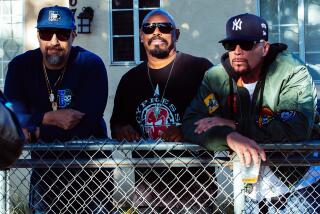BEHIND THE APARTHEID CURTAINS
- Share via
ABC’s “Nightline” has always been a pioneer, a fluke outgrowth of Iran’s prolonged detention of American hostages. Its very existence--as a late-night network news program peeking behind the headlines--made it a TB oddity.
Its genesis with Ted Koppel as anchor came in November, 1979, under a different title. It began as “America Held Hostage,” a nightly accounting of the hostage dilemma, a temporary program tailored to a temporary problem. But it became such a widely watched fixture that ABC kept it going as a topical news interview program even after the hostages were safely on United States soil.
And now “Nightline” is trail-blazing again.
Koppel and company on Monday will become the first United States TV series to originate from South Africa, beaming five nights of programs from a nation whose government’s apartheid policies have brought it scorn from much of the world.
This may be historic matchmaking.
Scheduled first-night guests include South African Foreign Minister Roelof F. (Pik) Botha and Bishop Desmond Tutu, the Nobel Peace Laureate and black Anglican opponent of the Pretoria government.
“To the best of my knowledge, they have never even talked before,” Koppel said from Washington.
Monday’s program also will feature Koppel’s previously taped interview with Winnie Mandela, wife of jailed black opposition leader Nelson Mandela.
Set for Friday’s finale are South African President Pieter W. Botha, and also Andries Treurnicht, leader of the right-wing Conservative Party, and Oliver Tambo, leader of the outlawed African National Congress. Koppel speculated that this also might be the first dialogue between Treurnicht--whose nickname is “Dr. No”--and Tambo who will be speaking from London via satellite.
Why would South Africa allow “Nightline” to come in and stir things up?
“I think there are a number of reasons,” said Koppel, who had just returned from a Hawaii vacation where he pored over “40 pounds of books” on South Africa. “I think that they recognize they are not doing very well in the public-relations battle. And they feel that the American wave of antipathy toward apartheid is so great that they have nothing to lose.”
Indeed, pressures are increasing for the minority white government of South Africa to end its oppression of blacks, who are not allowed to vote despite being a majority. The number of anti-apartheid picketers is on the rise in the United States, and only Monday the Rev. Jesse Jackson spent a night in jail after being arrested for protesting outside the South African embassy in Washington.
But do we know all there is to know about South Africa?
I have a sense that Americans are fundamentally illiterate on the subject,” Koppel said. “South Africa is so important to the U.S., not only with apartheid in a moral sense, but strategically, with all the metals it supplies. Even though most Americans don’t realize it, we need what South Africa has. So are American interests best served by sticking with them, or are we better off in the long range by starting to disassociate ourselves? I have no answers.”
The problem is that the media tend to narrowly focus the nation on only one crisis at a time, becoming transfixed on one critical arena while ignoring what goes on elsewhere.
Koppel blames TV at least in part for any fuzziness about South Africa: “TV has always been the medium of conveying at least the first wave of knowledge, and we haven’t been doing a very good job of that so far,” he said. “So if we can do that with these programs, I will be thrilled.”
It was last summer when “Nightline” began thinking about a series of programs focusing on South Africa, and it approached the Pretoria government about the trip last November. “We told them we would have to have on people with contrasting viewpoints,” Koppel said, “and that if they told our people we would have to follow the laws of apartheid, forget it!”
South Africa gave its approval in late January. Yet the advance team that “Nightline” sent more than two weeks ago immediately ran into trouble with the government. Koppel said that despite the government’s previous assurances about scheduling of guests, “When we said we wanted to have Botha (the foreign minister) and Tutu on together, they said we were out of our minds.”
The government relented a week later, Koppel said, “and when Botha agreed to do it, that set the tone for everyone else.” Everyone “Nightline” sought for the show has been made available, Koppel said, except for Mandela, who has been in prison since 1964.
The programs (the first and last will be an hour, the others 30 minutes) will be taped in Johannesburg at 11:30 p.m. South Africa time, and Koppel was unsure whether they would be shown to South Africa.
“Ironically, the South African government was most concerned that we might go over there and devote 80% of the shows to the government opposition,” Koppel said. Did “Nightline” make any promises to the government? “Just one--the one we always make,” Koppel said. “We said we’d try to be fair.”
More to Read
Sign up for Essential California
The most important California stories and recommendations in your inbox every morning.
You may occasionally receive promotional content from the Los Angeles Times.










